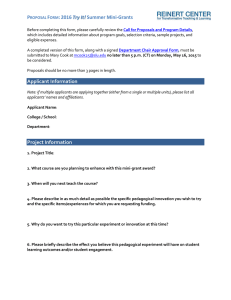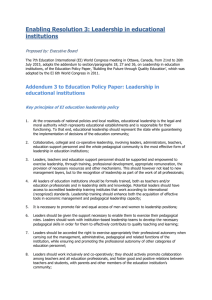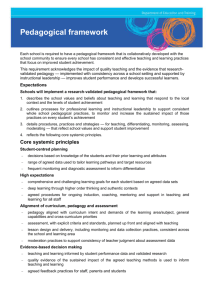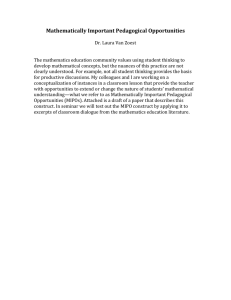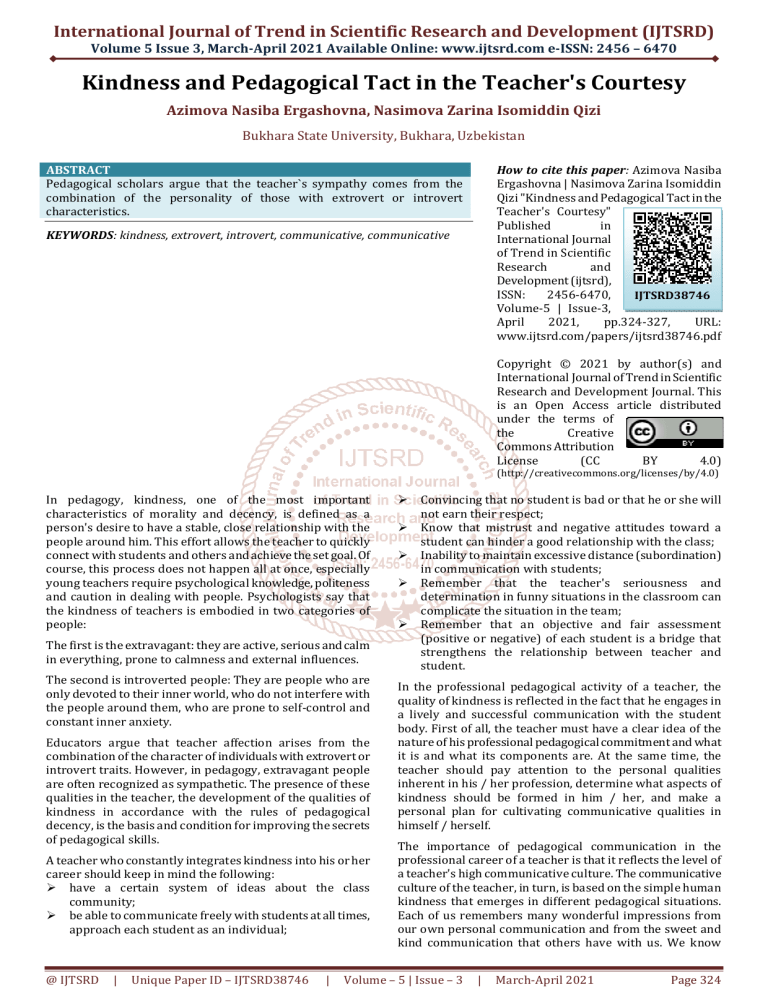
International Journal of Trend in Scientific Research and Development (IJTSRD) Volume 5 Issue 3, March-April 2021 Available Online: www.ijtsrd.com e-ISSN: 2456 – 6470 Kindness and Pedagogical Tact in the Teacher's Courtesy Azimova Nasiba Ergashovna, Nasimova Zarina Isomiddin Qizi Bukhara State University, Bukhara, Uzbekistan How to cite this paper: Azimova Nasiba Ergashovna | Nasimova Zarina Isomiddin Qizi "Kindness and Pedagogical Tact in the Teacher's Courtesy" Published in International Journal of Trend in Scientific Research and Development (ijtsrd), ISSN: 2456-6470, IJTSRD38746 Volume-5 | Issue-3, April 2021, pp.324-327, URL: www.ijtsrd.com/papers/ijtsrd38746.pdf ABSTRACT Pedagogical scholars argue that the teacher`s sympathy comes from the combination of the personality of those with extrovert or introvert characteristics. KEYWORDS: kindness, extrovert, introvert, communicative, communicative Copyright © 2021 by author(s) and International Journal of Trend in Scientific Research and Development Journal. This is an Open Access article distributed under the terms of the Creative Commons Attribution License (CC BY 4.0) (http://creativecommons.org/licenses/by/4.0) In pedagogy, kindness, one of the most important characteristics of morality and decency, is defined as a person's desire to have a stable, close relationship with the people around him. This effort allows the teacher to quickly connect with students and others and achieve the set goal. Of course, this process does not happen all at once, especially young teachers require psychological knowledge, politeness and caution in dealing with people. Psychologists say that the kindness of teachers is embodied in two categories of people: The first is the extravagant: they are active, serious and calm in everything, prone to calmness and external influences. The second is introverted people: They are people who are only devoted to their inner world, who do not interfere with the people around them, who are prone to self-control and constant inner anxiety. Educators argue that teacher affection arises from the combination of the character of individuals with extrovert or introvert traits. However, in pedagogy, extravagant people are often recognized as sympathetic. The presence of these qualities in the teacher, the development of the qualities of kindness in accordance with the rules of pedagogical decency, is the basis and condition for improving the secrets of pedagogical skills. A teacher who constantly integrates kindness into his or her career should keep in mind the following: have a certain system of ideas about the class community; be able to communicate freely with students at all times, approach each student as an individual; @ IJTSRD | Unique Paper ID – IJTSRD38746 | Convincing that no student is bad or that he or she will not earn their respect; Know that mistrust and negative attitudes toward a student can hinder a good relationship with the class; Inability to maintain excessive distance (subordination) in communication with students; Remember that the teacher's seriousness and determination in funny situations in the classroom can complicate the situation in the team; Remember that an objective and fair assessment (positive or negative) of each student is a bridge that strengthens the relationship between teacher and student. In the professional pedagogical activity of a teacher, the quality of kindness is reflected in the fact that he engages in a lively and successful communication with the student body. First of all, the teacher must have a clear idea of the nature of his professional pedagogical commitment and what it is and what its components are. At the same time, the teacher should pay attention to the personal qualities inherent in his / her profession, determine what aspects of kindness should be formed in him / her, and make a personal plan for cultivating communicative qualities in himself / herself. The importance of pedagogical communication in the professional career of a teacher is that it reflects the level of a teacher's high communicative culture. The communicative culture of the teacher, in turn, is based on the simple human kindness that emerges in different pedagogical situations. Each of us remembers many wonderful impressions from our own personal communication and from the sweet and kind communication that others have with us. We know Volume – 5 | Issue – 3 | March-April 2021 Page 324 International Journal of Trend in Scientific Research and Development (IJTSRD) @ www.ijtsrd.com eISSN: 2456-6470 many educators who show kindness in their interactions. They can easily communicate with people in any situation. However, there are teachers who want to focus on the whole conversation and work at the very center of communication. There are also teachers in life who are reluctant to communicate, reluctantly participate in conversations, and do not play an active communicative role at all. Supports the interlocutor only with his communicative behavior. Sometimes there are dark-skinned teachers who can't communicate with anyone at all. However, in pedagogical activity, politeness in communication is manifested not only as a human quality, but also as a high personal quality in the profession of anyone who chooses the teaching profession. Politeness is described as an example of high manners in the works of Eastern thinkers. Kindness is a great decoration for a teacher and is interpreted as a etiquette and instilled in the minds of students. The kindness and generosity of a teacher is one of the many virtues that pervade the whole process of global humanism. Interviews with former teachers who have given up their teaching careers have revealed that many of them are rude and rude. Communicating with people is not fun for them. As a result, he did not develop his professional qualities as a teacher. The process of communication is a continuous, longterm, comprehensive process. This is why pedagogical activity is tiring for rude and impolite teachers, the work process irritates and irritates them, it undermines the work of the educational institution. Politeness and kindness, as human qualities, have become one of the highest professional qualities of teachers, which ensures the effectiveness of the teacher's pedagogical communication. Pedagogy requires special training in the formation of politeness and kindness in the professional guidance of future teachers in higher education institutions. Teacher kindness is a process that combines three components: the need for communication; good mood after communication, during communication, before communication; have communication skills and competencies. This description describes the creative aspects of communication in the teaching profession. However, the need for communication is always a universal trait that applies to all professionals. In his research, the Russian scholar AV Mudrik identifies the following criteria that determine a teacher's ability to communicate politely and to develop skills: conformity of human thinking to specific features; perfect oratory or freedom of speech; politeness and sweetness; Empathy and spontaneity; a clear social attitude towards a specific goal (for example, self-interest rather than the results of the communication process); Communicative skills - a clear focus on time, the inner world of the interlocutor, the relationship, the situation. In this context, it should be noted that the pedagogical devotion that exists in the professional activity of a teacher also has a specific meaning, and the following components can be distinguished: There is a constant need for constant communication with students in different conditions of education and upbringing; @ IJTSRD | Unique Paper ID – IJTSRD38746 | Continuity in the teacher's display of personal and professional kindness and courtesy; a feeling of peace of mind at all stages of kindness and courtesy; the effectiveness of communication and the positive impact on various components of pedagogical activity; availability of skills in the process of pedagogical communication; Continuous acquisition of pedagogical communication skills and competencies by the teacher. Nowadays, education is of a humane, democratic nature, teaching students to think freely, independently and consciously, to educate them intellectually and spiritually, to impart in-depth knowledge, professional skills and abilities from the teacher. , requires high moral qualities. In this regard, the "Pedagogical Tact" is recognized as an important pedagogical skill in the teacher's relationship with students. The word tact has long been used in pedagogy to mean educational influence and has been defined as an ethical category that helps manage relationships with students. Even in the most difficult situations that occur in the process of communicating with students, pedagogical tact requires absolute calmness, respect and esteem for the interlocutor. Pedagogical tact is the basis of a teacher's professionalism, a measure of pedagogical influence on students in accordance with all democratic requirements, the establishment of communication on the basis of humane feelings, independent thinking and conscious discipline in students. is a form of building content building skills. In pedagogy, the teacher's relationship with students is determined by their age, and this law is strictly enforced. Therefore, a teacher should never forget that in the process of education he communicates with people who are not yet fully formed, who are quick to give in to influences and emotional experiences, who are hard-hearted children who are the beloved children of their parents. In communication with students, the use of rude, unfair, intimidating, insulting, disregarding, pedagogical methods that are contrary to pedagogical tact, and the use of various slang words that negatively affect their personality it can injure the hearts of students beyond repair, or damage the reputation of the teacher. Such conflicts between teacher and student often occur in class and out of class. This is especially true of young teachers who do not know the secrets of pedagogical tact and inexperience. A teacher's tactical skills do not develop overnight, but improve over the years in teaching, learning from teachers, teaching, extracurricular activities, and interacting with students during educational hours. It is important for a teacher to have pedagogical tact, which is the basis of pedagogical skills in the classroom. Factors ensuring the continuity of pedagogical discipline: Pedagogical delicacy is a process that is refined and improved in the whole pedagogical activity of a teacher Pedagogical delicacy is not usually complete, but is constantly enriched by human qualities. The teacher can change the components of pedagogical politeness depending on the social environment and people's lifestyles and traditions; The teacher must always strive to master the subtleties of pedagogical delicacy Volume – 5 | Issue – 3 | March-April 2021 Page 325 International Journal of Trend in Scientific Research and Development (IJTSRD) @ www.ijtsrd.com eISSN: 2456-6470 The teacher keeps the pedagogical politeness in the most convenient way for the interaction with each student. A sincere love of his profession, honesty, integrity, moral purity, humanity, humility, sincerity are the necessary requirements of pedagogical decency On the basis of pedagogical courtesy, the kindness of the teacher combines the qualities of demanding and strict in education On the basis of pedagogical delicacy, the teacher enriches pedagogical etiquette and moral norms with his worldview and moral experience. The teacher should give pedagogical teachers a fair assessment of each situation in the process of education and upbringing, the correct perception of students' behavior, perseverance and tenacity, self-control, patience, sensitivity, conscience, by incorporating features such as aria. Only a teacher who loves his profession in pedagogical work, devotes all his energy, light of heart and warmth of heart to this work and achieves good results in his work. Loving children is one of the most important qualities of a teacher. The teacher meets with the students almost every day, asks and answers questions, approves their good behavior and good deeds, evaluates their knowledge, reprimands them for their misbehavior, and uses educational methods when necessary. Pedagogical delicacy requires constant research and creativity. A teacher who is constantly engaged in creative research will have research skills and will be able to think freely about the problems of science, educational ethics and psychology. The teacher should try to get into the students' communication system with adults to some extent and learn their internal rules. It is based on talking to students, studying their behavior, observing their relationships with peers and adults, analyzing different events and problems in their lives together, and knowing their opinions about what is happening in their environment. is done. In doing so, he will have the opportunity to learn about hidden events and happenings in the student body that would never be known from the outside. As a result, the teacher is able to involve students in solving the tasks facing them in the educational process. To be successful, a teacher must be able to gain the trust of students. In order for a young student to gain or gain the trust of "friends", the teacher must be able to use the opportunities of pedagogical politeness in their place. Once a relationship of trust has been established, students turn to the teacher for help in difficult times and share their thoughts with him or her. Mutual trust, even in informal relationships, allows the teacher to see the inner world of students, which is sometimes incomprehensible. As a result of the use of pedagogical tact in dealing with students: The teacher gets to know the character and inner world of students, has the opportunity to communicate with students in a friendly manner; The teacher is genuinely close to the students, sometimes passing by without listening to the mysterious conversations of students who should not be heard, because the words of others listening is obscene; The teacher can sometimes interfere with the day-today work of the student body and leave it to the @ IJTSRD | Unique Paper ID – IJTSRD38746 | community activists to resolve some of the problems that occur in the community. All this eliminates the teacher's conflicts, disagreements and conflicts with students. It is natural for any professional in our country to have examples of etiquette and morality, but pedagogical politeness and etiquette is a real skill for teachers who require a completely different approach and treatment. Because these qualities are formed only over the years in a teacher who has pedagogical ability and talent. Based on the self-observation, determine the importance of the qualities of kindness to yourself as a professional quality, so that in the process of communicating with students you can identify for yourself the main shortcomings of your pedagogical activity. Individual-typological program of education ”. This program can be a program to develop kindness and courtesy in the teacher as a professional quality (when the level of communication with students is low) and to eliminate negative attitudes in communication with students (tightness, shyness, tension and etc.), creates the basis for the formation of professional and communicative skills and competencies in the short term. The system of communicative self-education should be designed individually, taking into account the recommendations given. Of course, many things about communication can be developed by any teacher with his or her own common sense and experience. For example, people who feel a natural discomfort in communicating with others should consciously increase their experience after such communication, overcoming psychological barriers for a specific purpose. To do this, a young teacher should strive to be more involved in various seminars, meetings, teacher circles, and use every opportunity to communicate with colleagues and people. For example, set a task to talk to several colleagues about a problem. Ask older, experienced teachers any questions you may have, comment on the behavior of the store clerk in dealing with customers, and so on. When answering a passenger's question on the street, try to understand that he is satisfied with it. Each time you prepare for a lesson, keep in mind not only how to use pedagogical tools and techniques to bring in new material, but also how to interact with the class. Think about interacting with students in extracurricular activities. Never forget the situations in the conversation that made a great impression on you and gave you a good mood. Try to analyze some of the failures in communicating with students. Acknowledge and see your mistakes, and think about how to organize the next conversation to give you satisfaction. If you are told that you are an unworthy person in communication, never get depressed. Try to convince yourself that your attitude, behavior, life and work experience are the opposite, and that you have the qualities of kindness and courtesy in communication. Constant work on your professional situation based on experience is important in developing the professionally important features of sincerity in communication, improving communication skills, and developing pedagogical professional skills and competencies. If the purpose of education and upbringing is a positive impact on the individual, then it is in the context of interaction with students that the teacher must enter their spiritual world. The formation of pedagogical skills is greatly influenced by the educational process in educational institutions that train Volume – 5 | Issue – 3 | March-April 2021 Page 326 International Journal of Trend in Scientific Research and Development (IJTSRD) @ www.ijtsrd.com eISSN: 2456-6470 teachers. But every future specialist - a coach, a teacher working in an educational institution - must show great enthusiasm to develop their pedagogical skills. Pedagogical ability is not only a condition of pedagogical activity, but also a result. Pedagogical skill is characterized by the presence of pedagogical etiquette (delicacy) in the specialist-coach. The general moral education of a specialist-coach is the basis of pedagogical etiquette. Pedagogical etiquette is the specific implementation of pedagogical ethics towards students. Pedagogical etiquette is a teacher's moral character, which includes high humanity, kindness to people, self-control, patience, and the ability to establish a benevolent relationship in any situation. A professional educator-coach masterfully manages his relationships with students, parents and colleagues. In pedagogical etiquette, first of all, there is a deep respect for the person. The tutor deals with the student’s compositional personality and implements all of his or her interactions with students based on the principle of being as intelligent, demanding, and as respectful of the person as possible. A number of professional skills are associated with pedagogical ethics. It is the ability to assess the pedagogical situation, to take into account the characteristics of the students, to anticipate the effect that the pedagogical impact may have. Pedagogical etiquette is a sign of the presence of high pedagogical skills. Mastering pedagogical etiquette requires a professional coach to think carefully about himself. The tutor must be able to constantly monitor his behavior, look at it, express his attitude to the behavior of students with gestures. That is, pedagogical etiquette implies that the teacher has a purely external ability to express their feelings. This set of skills is an integral part of pedagogical skills and is called pedagogical technique. Pedagogical techniques allow the coach to choose the right way to communicate with students and their parents. Behavior, style of communication with students, diction, facial expressions, the right choice of gestures, all this is part of the concept of pedagogical techniques. The national program pays special attention to the pedagogical skills, intellect and culture of the specialist-coach, and the specialist-coach constantly checks his pedagogical skills, ability to solve professional tasks, the most important for the child's mind and heart. it is emphasized that they must seek good ways. The national program emphasizes that a specialist-coach should not only equip his students with knowledge. Taking into account the real potential of students, their ability to do things that are encouraged by the educator, is the essence of a personal approach to the use of pedagogical tools. Sometimes, one or another pedagogical influence is ineffective because the educator does not provide the necessary material means for its implementation. For example, not all students are provided with the tools they need for the job, and the teacher asks them to complete the @ IJTSRD | Unique Paper ID – IJTSRD38746 | next task. Consistent implementation of general principles, such as the age and individual characteristics of students, is also important in the implementation of pedagogical interventions. As mentioned above, the success of the correct choice and application of this or that method of educational process requires the educator to know and take into account the pedagogical situation. The pedagogical situation has its own characteristics for the methods of pedagogical influence. Here are the key conditions for the successful application of pedagogical methods. This is, first of all, the relationship of the educator with the pupil. These relationships are not permanent, they develop and enrich in the process of interaction. It is quite clear that one of the methods of influence in a friendly relationship will be effective, and in a neutral or negative relationship (such a relationship may also exist) another method, a different form will be needed. Observation, which is the most important element of a person's perceptual characteristics, develops and improves both in the process of creating a pedagogical experience of the teacher, and as a result of his special efforts. The teacher is able to develop not only his socio-psychological observation, that is, the ability to notice in students the different character traits, tendencies, but also the ability to evaluate them according to the situation in which they appear. The teacher needs to teach his students, their interactions in their environment, their interactions with them in the present moment, as well as the skills of perception and vision, that is, teaching. must constantly improve the ability to perceive from the inside what is happening in the process of upbringing. Books: [1] Xoliqov A. Pedagogical skills (textbook). -T., 2011. [2] Azizxodjaeva N.N. Pedagogical technology and pedagogical skills (textbook). –T., 2006. [3] Ibragimov H., Yuldashev U. and others Pedagogical psychology (textbook). -T., 2007. [4] Ochilov Malla. The teacher is the architect of the heart. - T., 2000. [5] Pirmuhammedova M. Fundamentals of pedagogical skills.-T.: 2001. [6] Karimova V. Methodical manual "Independent thinking". -T.: - 2000 y. [7] Hamdamova M. Pedagogical and psychological bases of the mechanism of development of intellectual potential of youth (methodical recommendations), 2007. [8] Tolipov OK, Usmonbaeva M. Applied bases of pedagogical technologies.-T. 2006. Volume – 5 | Issue – 3 | March-April 2021 Page 327
